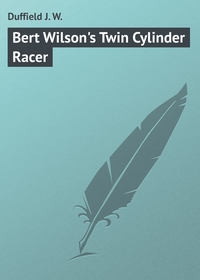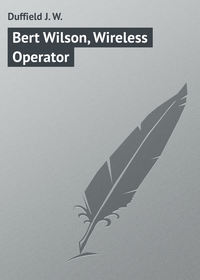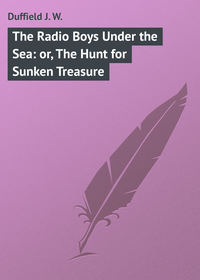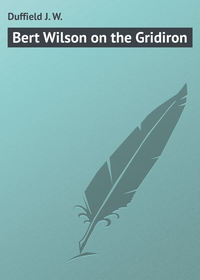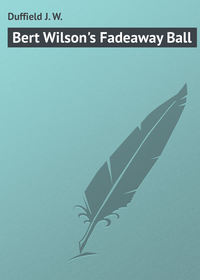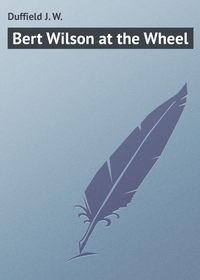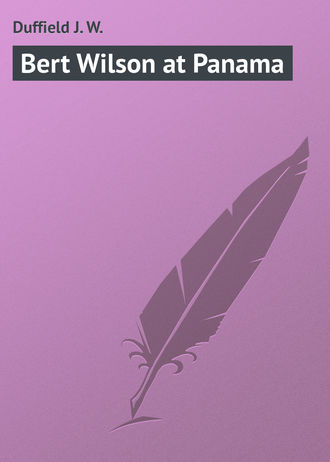 полная версия
полная версияBert Wilson at Panama
"If we had been standing a yard nearer the base of the image the whole party would have been dropped through the hole."
At this point Mr. Hartley paused in his narrative, and passed his hand over his eyes. The boys saw that great beads of perspiration covered his forehead, but they had been so absorbed in the story that they had not noticed this before. They waited breathlessly for him to resume, which he did after a few seconds.
"Well," he continued, "for a few seconds we were stricken motionless by the suddenness and horror of the thing. Then we gathered ourselves together, and rushed to the edge of the gaping opening. We shouted and called, and at last were answered by a faint moan. Then we looked into each other's eyes, and knew that there was only one thing to do. We must go down into that black hole and do what we could to rescue our friend.
"But how were we to accomplish this? We had no ropes, and the feeble light of our torches when we thrust them into the black opening failed to reveal any bottom. For this reason we dared not risk a drop, with almost the certainty of not being able to get back again."
"It looked as though we were 'up against it,' but finally we made a makeshift rope by tearing up part of our clothing into strips and tying them together. This made a fairly serviceable rope, and, after tying knots in it at intervals to facilitate our descent, we lowered it into the opening. When we had let it out almost to the end it stopped swinging, so we knew it had touched bottom. I volunteered to go down first, and did so."
"It was ticklish business, and more than once I almost lost my hold.
Finally, however, my feet touched a hard floor, and I let go."
"All right!" I shouted to those above. "Come on down."
"Coming, old man," replied 'Brad,' and the sound of his cheery voice was a great comfort to me. I knew he would soon be with me, and so gave my attention to finding and helping Bob. I had not gone more than a few steps when I discovered him stretched out on the cold rock floor, either unconscious or dead. I soon found the former to be the case, to my great relief, and forced a few drops of whiskey from my flask between his teeth.
"By the time Bradhurst had reached my side I could see some signs of returning consciousness in Bob's face, and before long he struggled to a sitting posture."
"Wh – what happened, anyway?" he asked.
"That's what we'd like to know," said Brad. "What made you fall that way. What struck you?"
"Something darted out of that cursed thing's mouth and pierced my hand," replied Bob, as he began to regain his memory. "Look at that!" and he held his left hand out for us to see.
"It had been neatly punctured by some sharp instrument, which left a small wound not more than an eighth of an inch across. The hand was puffed and swollen, though, and the thought flashed across my mind that this scratch was probably not as trivial as it looked. I had little doubt that the instrument, whatever it was, had been poisoned, and as I stole a swift glance at Brad I could see that the same thought was in his mind.
"Bob never seemed to think of this possibility, though, and you may be sure we were careful not to give him an inkling of our anxiety. That would do no good, and our fears might be unfounded.
"While we were examining the hand, our companions had descended, and of course Bob had to repeat the cause of the accident to them.
"But how do you feel now, old man?" queried Brad, when he had finished.
"Oh, nothing extra," replied Bob. "I seem to feel rather dizzy, but I suppose that's the result of the fall. I'm lucky not to have broken my neck."
"Well, anyway, it's up to us to get out of this hoodooed place as soon as possible," I told them. "Come along. I'll go up first, then you fellows come, and we'll haul Bob out."
"Accordingly I started up our improvised rope hand over hand. I had not ascended more than five or six feet, however, when with a slight r-r-ip the rope parted above my head, and I fell back to the stones below. Fortunately I landed on my feet, and so escaped with nothing worse than a severe shaking up.
"But I had small reason to be thankful, nevertheless, for the desperate nature of our position was soon borne in upon me. How to get out – that was the question, and, when I put it up to my companions, they had no answer.
"The place in which we were now imprisoned seemed to be a sort of tunnel. It was not more than fifteen feet wide, but we had no means of telling how long it might be. To get out the way we had come was evidently out of the question, as the roof of the tunnel was at least twenty-five feet above our heads.
"Well, boys," said Bradhurst, at last, "the only thing we can do is to follow the course of this hole one way or the other, and try to find an outlet. And the sooner we start the better, as our torches aren't going to last much longer."
"Here was another horror added to our situation, which had seemed bad enough before. Without light, our chances of escape from the horrible place would be slight indeed, so we acted on our comrade's advice without delay.
"There was apparently little choice of direction. Our torches burned steadily, and so we knew there was no breeze coming from either direction that might point to an outlet. Our sense of locality was rather twisted by this time, but after a consultation we set out through the tunnel in what we believed to be the direction of our camp. Before we had gone far, Bob complained of wanting to sleep, and it was all we could do to keep him moving. I walked on one side of him, holding his arm, while Wryburn, another of the party, supported him on the other side. Brad walked in front, carefully scanning the walls of the tunnel for signs of an opening.
"After we had gone a considerable distance in this manner, we heard a faint roaring sound, that grew constantly louder as we pushed forward.
"It sounds like water," said Wryburn. "We must be coming to a subterranean river."
"We had little doubt that this theory was correct, and pressed forward with renewed hope. At any rate, we had the assurance that the tunnel would not end in a blank wall, as we had feared, and so force us to retrace our footsteps.
"We were held back badly by Bob, though, who, by now, had become almost helpless. We were forced practically to carry him, and he seemed to have lost consciousness.
"All things have an end, however, and at last we stood on the bank of the underground river. It was two or three hundred feet wide, and raced along with a very powerful current. By this time you may be sure we were very thirsty, as well as hungry, and the cold water satisfied one craving if not the other. After we had drunk our fill we set to work dressing Bob's wounded hand as well as we could, which is not saying much. He seemed to be in a sort of coma, from which we were unable to arouse him."
"After we had made him as comfortable as possible we discussed plans of escape. I was of the opinion that our best course would be to follow the river in the hope of its emerging into the open at some point. There seemed to be no objection to this from my companions, so after a short rest we started out. First, we improvised a rude stretcher for Bob, and took turns carrying it."
"At the spot where we had first come upon it, the river was edged with a little strip of coarse gravel, but, as we progressed, this became narrower and narrower, and the river seemed to be running with even greater velocity than before. At last the strip of beach disappeared altogether, and we had no choice but to enter the water. We splashed along wearily, and hope burned lower and lower in our breasts. To add to our troubles, our stock of torches was almost exhausted, and we were forced to burn only one at a time, to make them last longer.
"The walls between which the stream now ran got closer and closer together, with the result that the water became deeper and rushed along with greater force. The sound of its roaring in the confined place was deafening, and communication with each other was out of the question.
"We had traveled perhaps three miles in this manner, when we suddenly noticed that the water seemed to be rising! Within a few minutes after we had observed this, it crept up to above our knees, and its roaring grew perceptibly louder. We looked desperately about us for some place of refuge, but there was none. The stream now ran in a cavern not more than eighty feet wide and ten feet high, and its smooth, water-worn walls stretched on into the darkness ahead without a break.
"We looked at each other in dismay, as the water crept up, deeper and deeper. Pieces of wood and branches of trees were now floating on it, and Bradhurst said, 'Boys, there must be a heavy rain outside, and this stream is feeling its effects. If we don't get to some place where it widens out very soon, we might as well write each other's epitaphs. We've got to hurry like – listen! What was that?'"
"From the blackness in back of us came a sudden loud, menacing roar, growing in volume every second."
"Come on, boys, quick!" yelled Bradhurst, setting us the example by forging ahead faster than before. "There's a big wave coming that'll fill this place up to the roof, and the Lord help us if it overtakes us here."
"We stumbled along as fast as we could, but could make but slow progress, burdened as we were by the helpless form of our comrade. The water was almost to our waists, and the awful wave back of us approached with horrible rapidity. We were about ready to give up, when Bradhurst, who was a little in the lead, came ploughing back to us.
"Come along for your lives, boys," he shouted above the noise of the water. "This infernal hole widens out a little further on, and if – here, you fellows are tired out. Hustle along, and I'll carry Bob."
"We tried to stop him, but he paid no attention to us, and, stooping over, lifted the unconscious form of our companion on his broad back. Thus relieved, we put all our ebbing strength in one last mad dash, pulling Brad and his burden along with us. At last we reached a place where the cavern widened, and struggled up on a strip of sandy beach. But we were not out of the water's power yet, by any means. We knew that our only salvation lay in finding some refuge above the highest level the stream would be likely to reach, and so began a frantic hunt along the walls of the cavern.
"By the greatest good fortune, my eye caught sight of a rocky projection, quite a way up the side of the cave, and I yelled to my companions. They hurried over, and we climbed desperately up the rocky wall. I was the first to reach the platform, and I helped the others over its edge. Bradhurst waited until we were all up, and then hoisted Bob up over his head. I leaned over as far as I could, and was just able to get a grip on the unconscious man. Assisted by the others, I pulled him up, and then in a twinkling we had Brad up, too.
"And not a second too soon, either. Even as we hauled our friend over the edge, a great foaming wall of water leaped out of the tunnel from which we had emerged not three minutes before, and boiled out over the floor of the cave in which we were. It washed against the walls, and we thought for a few seconds that it would even reach our place of refuge. It did lap up to within a foot of us, but then spread out more and subsided a little.
"We would have been as helpless as so many chips of wood if it had caught us while in the narrow tunnel, and we shuddered as we thought of our narrow escape.
"The ledge on which we found ourselves was amply supplied with driftwood, probably left there at the time of some former flood that had been even fiercer than this one. We made a fire, and waited for the water to subside with as much patience as we could muster. We knew that Bob would probably die unless we could get him to a doctor soon, and this made the waiting all the harder. At times he would rave in delirium, and at others lie so quiet that more than once we thought him dead.
"But the water did go down after what seemed to us an age, but was in all probability not more than a few hours. We resumed our journey down its channel, and by great good fortune came at last to the place where it emerged into the open air. The sun was shining brightly, and words are inadequate to describe our joy at seeing it once more. We took deep breaths of the warm tropical air, so grateful after the damp, confined atmosphere in which we had been so long, and thanked a kind Providence for our escape.
"We made our way back to our camp, and arrived just in the nick of time. Our guides had given us up as lost, and were much astonished at seeing us. After their first astonishment had worn off, they seemed to regard us with the greatest respect, which we were at a loss to account for at the time. We later found out that it was because we had been able to cheat the inexorable 'devil,' supposed to rule the old city, of his prey.
"We returned to camp by forced marches, and turned Bob over to the camp physician. He recovered at last, all but his hand, which never regained its power. The natives said it was the 'demon's curse,' and possibly they were right.
"At the time nothing could have hired us to go back to the old ruins, but lately I've had a sneaking desire to go back and finish exploring that old temple. Perhaps I shall, some day, and likely as not the devil will get me, this time. Who knows?"
Mr. Hartley ended his strange narrative with a smile, half serious, half comical, and his listeners drew a long breath.
They voted it one of the most exciting tales they had ever heard, and besieged the engineer with questions as to the location of the ruined city. But Mr. Hartley only shook his head.
"No, no," he said, and, although he smiled, his tone was serious. "It would be just like you madcaps to undertake a journey there, and I don't want to be the cause of your death. If you don't mind, I'd rather not tell you."
Although disappointed, the boys did not press the matter, and after a little further discussion of the engineer's story, took their departure.
"Just the same," declared Bert, on their way home, "I'd like nothing better than for us three to tackle that 'devil.' I have an idea we could stand him on his head."
"I'd like to try it, anyway," declared Tom, and Dick declared himself as feeling the same way.
They talked about little else that evening, and if, after they were asleep, they were troubled by nightmares, the cause was not hard to determine.
CHAPTER XII
WAH LEE'S BOSS
The next few days were crowded with incident. The city was filling up with visitors, to be present at the ceremonies attending the opening of the Canal. Many of these were celebrities known all over the world. Soldiers, admirals, diplomats, men of affairs, brushed shoulders with thousands less famous, but quite as interested in the great event so soon to take place. The boys were constantly meeting someone whom they had known in the "States"; and, in the renewal of old friendships and the making of new ones, the time flew by as though on wings.
But, underneath all the hubbub and excitement, Bert was conscious of an uneasy premonition. He tried to analyze it, and, when unsuccessful in this, attempted to throw it off. Despite all his efforts, however, it persisted. Call it clairvoyance, call it telepathy, he felt aware of impending danger. Some "coming event" was casting "its shadow before."
Again and again the words of Allison recurred to him. Not that he believed in them. Although they had stirred him at the time with a sense of vague foreboding, he had dismissed them as the utterance of an enthusiast, who felt a deep antipathy toward the Japanese, and magnified the danger to be feared from them. Of course, it was absurd – that last remark of his that at that very moment a Japanese fleet might be on its way to attack the Pacific Slope. He laughed as he thought of it, but, somehow, the laugh did not ring true.
Wah Lee had kept his word, and frequently called to see his friends. But his serenity seemed to be disturbed. He appeared troubled and distrait. At times, he acted as though he were about to tell them something, but was himself in doubt as to the value of his information, and restrained himself. His all-embracing smile was conspicuous by its absence.
"What's bothering the old chap, I wonder," ruminated Tom.
"Search me," laughed Dick. "Something on his conscience, maybe. Perhaps he hasn't burned as many joss sticks before his particular idol as he feels he ought, and the failure worries him."
"I'm going to get right down to brass tacks, the next time he comes," said Bert, "and get it out of him."
But the wily Celestial baffled all efforts to "pump" him, and the matter passed from their minds.
Two days later, however, Wah Lee shuffled past Bert, as the latter was sauntering down the main street of Colon, and, apparently by accident, touched his arm in passing. Bert looked up, and, recognizing the Chinaman, started to speak to him. But the latter only gave him a swift glance from his almond eyes, and kept on, his face as stolid and inscrutable as that of a graven image. In that fleeting look, however, Bert's quick perception recognized that Wah Lee had some object in view, and wanted to talk with him. With a heightened pulse, but still retaining an indifferent air, he followed.
At the first turning, the Chinaman passed into a side street, Bert keeping a little way in the rear. The houses grew more infrequent and soon they came to the suburbs. Still on they went, until, at last, they were in the open country, and free from observation. Then, in a remote spot, where they could see for a long distance on every side, Wah Lee stood still, and Bert ranged alongside.
"Well, Wah Lee," he asked, curiously, "what's the game?"
In answer, the Chinaman drew from his pocket a crumpled sheet of paper, and handed it to Bert. He took it and smoothed it out. At first, it failed to convey any impression. The drawing was a rough one, and seemed to consist of a series of lines, punctured with dots. But gradually, as Bert gazed, his training in mechanics told him that it was a plan of some large structure. There were two rectangular outlines, that were perfectly similar, like two leaves of a table. No, they were gates. And then, like a flash, it came across him. They were the gates of the Gatun Locks! There was the wavy line, to indicate the water level, and, down below these, were the ominous dots. They seemed to be meant for holes, but his knowledge of the locks told him that they had no place in its structure. What did those holes mean?
A little shaken, he looked at Wah Lee for the key to the enigma.
"Where did you get this?" he asked.
"Found it," answered the Chinaman. "Man drop it. Man come to see my bloss. My bloss kill clanal," Wah Lee repeated.
For a moment, Bert's head swam, and a thousand bells seemed to ring in his ears. Then he steadied himself, and plied the Chinaman with eager questions that sought to pluck the heart out of the mystery. Wah Lee's knowledge of English was very limited, and it took a long time and infinite patience to get from him what he knew. Gradually, he pieced the bits together, until the whole thing became clear and coherent in his mind.
By the merest accident, Wah Lee had heard enough to know that the Japanese who employed him was engaged in a plot to destroy the Canal. How or when it was to be done, he did not know. It was doubtful if he could have grasped the details, even if he had heard them, so full they were of technical matters that conveyed to him no meaning. But he knew that the plot existed, and dimly understood that this would bring pain and suffering to Bert. As far as he himself was concerned, a dozen canals might be destroyed, without affecting him in the least. But he held the boys in strong affection for having saved his life, and he knew that he could pay his debt, at least in part, by letting them know what was brewing.
As regarded the paper, Wah Lee knew nothing, except that a white man, who spoke English, was a frequent visitor to his master, with whom he held long conferences. Only yesterday, on leaving the house after dark, he had accidentally dropped the plan, and Wah Lee, hovering near, had picked it up. A vague idea that it might be of value to Bert and prompted him to bring it to him.
This was the sum of the Chinaman's knowledge. He simply knew that his "bloss" was engaged in some kind of a plan to kill the Canal.
But Bert must know more than this – the nature of the plan, the people involved in it, the methods employed for it, the time set for its execution. Then, only, could the proper steps be taken to thwart it. How could this knowledge be obtained? Not by Wah Lee. He had accidentally stumbled upon it, and while this, of course, was an inestimable service, abler minds than his must unravel the details.
Whatever was to be done must be done quickly. Time was a factor of prime importance. Bert looked up at the sky. The sun was near its setting. Night would come on suddenly.
With the rapid resolution that was one of his chief characteristics, Bert made up his mind.
"Make tracks for home, Wah Lee," he said. "I'm coming with you."
The Chinaman made no demur and expressed no surprise. He led the way and Bert followed, racking his brain for the best thing to do. His plans took shape quickly. By the time they drew near the grounds, darkness had enveloped them like a blanket. He halted the Chinaman and talked to him in whispers.
He must get into the house, without being seen. Where did the talks with the white man take place? In the library. Very well. Was there any place where he, Bert, could be concealed and hear what went on?
But here the Oriental departed from his wonted calm. There was too much risk. Bert would be killed. His master had men in the house who obeyed him absolutely. If he merely lifted his finger, they would kill one man or twenty men.
But Bert was not to be deterred from his purpose. He had embarked on this venture, and, live or die, he would see it through to a finish. He cut short the protestations of the frightened Celestial and commanded him to show him the nearest way to the library.
There was no way, Wah Lee averred. The house swarmed with servants, and detection would be certain. Every window and every room in the mansion was ablaze with light. Unless he could make himself invisible, the attempt was hopeless.
Circling about the house, in the shadow of the shrubbery, Bert studied the location of the room that the Chinaman had pointed out as the library. It was on the second floor, and a broad veranda surrounded the house, about two feet beneath the window. Near by, a giant tree upreared its branches. With a parting word of caution, Bert shied up the tree with the agility of a cat. He ensconced himself firmly on a projecting branch, and peered through the heavy foliage.
The room into which he looked was a spacious one and furnished with all the sumptuousness of Eastern luxury. Exquisite tapestries draped the walls, and priceless jades and porcelains bespoke the taste as well as the wealth of the owner. Quaint weapons and suits of armor, doubtless worn at some time by a shogun or samurai ancestor gave a touch of grimness to a beauty and delicacy of ornament that might otherwise have been excessive.
At a magnificent library table of ebony, inlaid with pearl, a man was seated with his head on his hand, in an attitude of profound thought. His left hand, playing with the ivory handle of a dagger that lay on the desk, betrayed a certain restlessness, as though he were waiting for someone. From time to time he raised his head, as if listening. At last he threw himself back in his chair with a gesture of impatience, and, with unseeing eyes, looked out of the window. And now, Bert, from his leafy covert, could study his face at leisure.
It was a typical Japanese face, with the high cheekbones and slanting eyes that marked his race. But nothing could hide the proofs of breeding and culture that were revealed in every feature. It was the face of a statesman, a scholar, a warrior, a prince. The habit of command was stamped upon it, and in his eyes glowed a spirit of resolution that almost reached fanaticism. Bert felt instinctively that here was a foeman worthy of any man's steel, a formidable enemy who would sweep away like chaff anything that stood between him and the accomplishment of his purpose.


